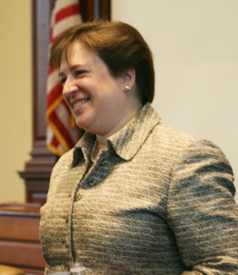Truthout is an indispensable resource for activists, movement leaders and workers everywhere. Please make this work possible with a quick donation.
Losing just one vote from the Democrats, the Senate approved Elena Kagan for the Supreme Court, 63-37, Thursday afternoon.
Despite Sen. Ben Nelson’s (D-Nebraska) vote against her nomination, Kagan picked up five Republican backers: Susan Collins, Lindsey Graham, Richard Lugar, Olympia Snowe and Judd Gregg. South Carolina’s Graham was the only Republican member of the Senate Judiciary Committee to support the nominee.
Sen. Sheldon Whitehouse (D-Rhode Island) said the Senate made the right decision.
“Kagan will join a court dominated by conservatives that too often has departed from its best institutional traditions, resulting in unprecedented and sharply divided decisions favoring special interests and big corporations,” Whitehouse said. “I hope that Kagan will help provide a counterbalance to this disturbing trend.”
In a statement, President Obama said since he nominated Kagan to the High Court, the Senate Judiciary Committee has “scrutinized Elena’s record as a scholar, as a law school dean, as a presidential advisor, and as Solicitor General.”
“And after 17 hours of testimony during which she answered more than 540 questions, I’d say they got a pretty good look at Elena Kagan,” Obama said. “They’ve gotten a good sense of her formidable intelligence, her rich understanding of our Constitution, her commitment to the rule of law, and her excellent — and occasionally irreverent — sense of humor. And they have come to understand why, throughout her career, she has earned the respect and admiration of folks from across the political spectrum — an achievement reflected in today’s bipartisan vote.”
Sen. Sherrod Brown (D-Ohio) Kagan displayed a “deep respect for the law” during her confirmation hearings. But he urged her to “resist the drift toward judicial activism that produced the Citizens United decision, overturning a century of jurisprudence to give large corporations too big a voice in our elections.”
House Speaker Nancy Pelosi said, “It is a true tribute to our heritage of progress and our promise of equality that, when Elena Kagan is sworn in, three women will sit on the Supreme Court for the first time in history.”
The session was not without its barbs. Shortly before the vote, Minority Leader Mitch McConnell (R-Kentucky) enumerated the reasons he felt that Kagan should not be appointed. Among them was her work as an opposition researcher for presidential candidate Michael Dukakis, during which McConnell said it was her job “to attack the Republican opposition.”
McConnell said Kagan’s work with Dukakis was part of “a pattern . . of political activity” that continued to show itself when she worked as an advisor to President Bill Clinton as well as during her time as dean of Harvard Law School.
Unlike last summer’s confirmation hearings for Justice Sonia Sotomayor, this summer’s hearing had no catch phrase. It also lacked a judicial record to critique (though Republicans certainly knocked Kagan’s lack thereof). However, these disadvantages did not leave senators speechless. Among the more contentious issues during the three-day grilling was a Harvard Law School policy that denied military recruiters access to the school’s career center.
The law school uniformly banned employers that discriminated based on factors such as age, race and sexual orientation from using campus facilities. This policy kept recruiters out of the career center. Critics seized on Kagan’s support for the ban.
Senators also used the hearings to rail against current court decisions, assailing the High Court’s verdicts in Citizens United and the Lilly Ledbetter case, and asking how Kagan, as a justice, would have ruled. Like her predecessors’ answers, however, Kagan’s responses revealed little.
Elena Kagan will replace retiring Justice John Paul Stevens who joined the Supreme Court in 1975.
A terrifying moment. We appeal for your support.
In the last weeks, we have witnessed an authoritarian assault on communities in Minnesota and across the nation.
The need for truthful, grassroots reporting is urgent at this cataclysmic historical moment. Yet, Trump-aligned billionaires and other allies have taken over many legacy media outlets — the culmination of a decades-long campaign to place control of the narrative into the hands of the political right.
We refuse to let Trump’s blatant propaganda machine go unchecked. Untethered to corporate ownership or advertisers, Truthout remains fearless in our reporting and our determination to use journalism as a tool for justice.
But we need your help just to fund our basic expenses. Over 80 percent of Truthout’s funding comes from small individual donations from our community of readers, and over a third of our total budget is supported by recurring monthly donors.
Truthout has launched a fundraiser to add 500 new monthly donors in the next 9 days. Whether you can make a small monthly donation or a larger one-time gift, Truthout only works with your support.
